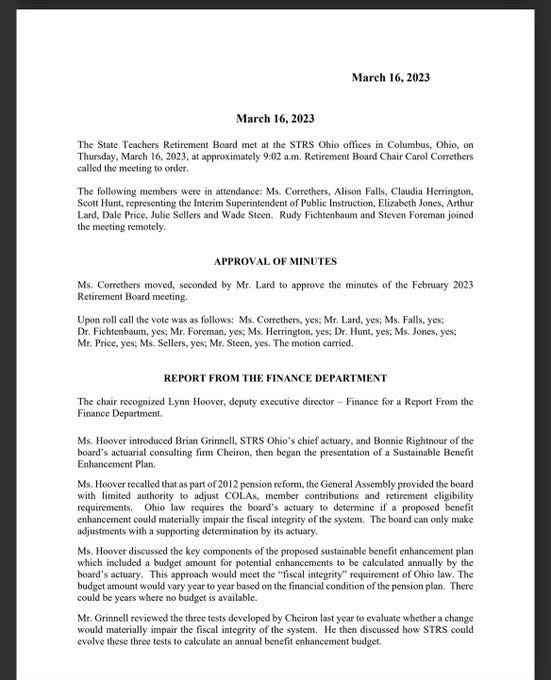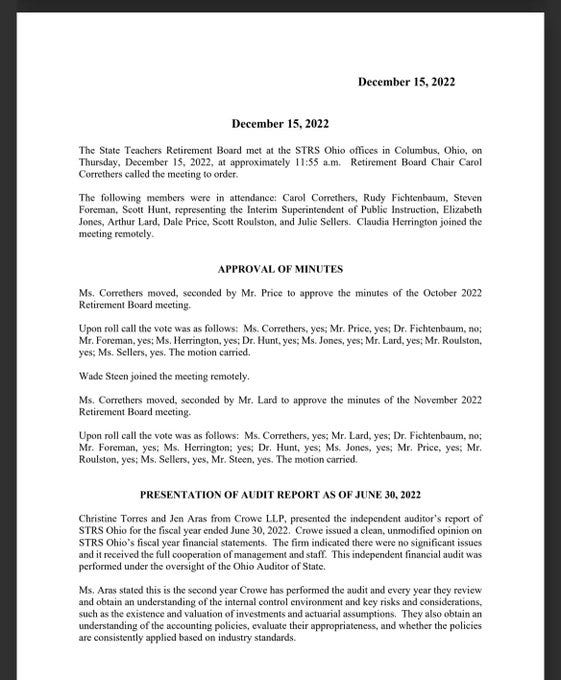You are going to want to read this. Believe me:
Amid many things a state government is involved with, none has bigger financial or human consequences than its retirees’ pension funds.
Billions of dollars. Thousands of retirees depending on the funds’ success. Careers and fortunes made.
It’s so much money, with so much consequence, that there are safeguards to make sure politicians don’t interfere with decisions about how those funds are invested. (In the past, state-level politicians have gone to jail for meddling in fund investments).
For example, there’s a rule barring companies and individuals involved in pension fund investments from contributing to state-level politicians. And there are a variety of protections at the state level to keep state officials from meddling in pension funds.
Regarding one enormous pension in Ohio, there’s a specific law that protects seated board members—once appointed or elected to a term—from being removed without cause.
That makes sense, because if pension board members can be switched in and out at the whim of politicians or others, that would open a huge risk of meddling in their decisions, as well as meddling with the board makeup overall. And especially in a state like Ohio, already rife with pay-to-play politics involving public funds, that would surely invite scandal.
The board with that particular protection is the Ohio’s State Teachers Retirement Board. It manages a huge pension—more than $90 billion—for more than 150,000 retired teachers. As the map below shows, the pension has a huge economic impact on communities across Ohio:
The specific process for removing any of the Teachers Retirement Board’s 11 members is spelled out in the Ohio Revised Code:
First, outside of the commission of certain crimes, ORC 3307.061(B) lays out a threshold for “misconduct in office” that must be met for removal: a member who “willfully and flagrantly exercises authority or power not authorized by law, refuses or willfully neglects to enforce the law or to perform any official duty imposed by law, or is guilty of gross neglect of duty, gross immorality, drunkenness, misfeasance, malfeasance, or nonfeasance is guilty of misconduct in office.”
Second, as you’d expect, you can’t just trigger removal by alleging such misconduct. ORC 3307.061(C) spells out that the Governor or another official (depending on which board member it is) must go to common pleas court (where the board member resides) and file and sign a “written complaint specifically setting forth the charge.” If the court finds the charge to be true, it can order the member’s removal, and must spell out its findings in a “full, detailed” statement. Even then, the board member has a right to appeal that decision to an appellate court.
Nowhere in the law is there an exception to this process—for either appointed or elected members. Why would there be, if the whole point is to protect members from outside interference and meddling?
So why am I bringing this up now?
Because last May, Ohio Governor Mike DeWine flagrantly and openly violated this process. And the law.
And no accident, he did it at a time and in a way that had maximum impact on the makeup of the pension board. In fact, his action altered the outright majority of that board at a key moment, and has altered that majority (and major decisions) ever since.
But last week, he finally began to face accountability for his actions. Even in a state rife with scandal, this should all be treated as a BIG deal.
Read on to see why…
An Election for the Majority
Last May, there was a high-stakes, sharply contested election for a single spot on the 11-member Ohio Retired Teachers Pension Board. But that one spot was pivotal for the long-term direction of the board.
The video below explains the basics—but to summarize it, there have been two camps, at odds, on the teachers pension board:
One group is unsatisfied with the returns of the pension, and the fact that while pension staff have been making nice bonuses, retired teachers have not received consistent COLAS for years. This group is asking tough questions about the investments and returns, transparency, the payment of those bonuses, etc. Let’s call them the “reform” group.
Then there’s another group we can call the “status quo” group, who seem more satisfied with where things are.
The “reform” group has been in the minority, but due to frustration of retirees, had gained enough seats so that last May, they were one board seat short of the six-seat majority. Which meant last May’s election would determine which of the two factions would comprise the majority going forward. If the “reform” candidate won, that would give the “reform” camp its first majority—which would have an impact on a whole lot of money and a whole lot of lives.
A spirited election took place between the two camps. The final votes were cast by Monday, May 1—so the election ended that day. The results were to be announced the Friday that followed—May 5.
And it was between those two critical dates—after the votes were in, but before they were announced—that something truly stunning took place.
Governor Mike DeWine swooped in….
…and terminated a different board member (the one in the seat he appoints to the Board for a four-year term)..
So, I’m sure you’re thinking—based on the law I explained above—DeWine must’ve filed the required written complaint to the court alleging sufficient misconduct by the member he terminated, and the court must have found his complaint and evidence compelling. Right?
But that’s the problem….he didn’t.
He didn’t even try!
At first, he called up that board member (a former Republican County Treasurer named Wade Steen) and demanded that the board member resign. Steen refused. So then DeWine later called again and informed him that he had unilaterally replaced him with someone else, who happened to be a major donor to DeWine. Within days, Steen’s access to all Teachers’ Pension Board facilities and systems was terminated.
And again, all of this occurred without DeWine using any process at all. Just up and replaced the guy. No written complaint. No court. No decision.
Meaning DeWine defied the statute outright. Steen even warned him as much (politely) in the letter above.
And you can probably guess what happened next….
On Friday of that week, the election result for the open board seat was announced, and it turns out the candidate from the “reform” camp had won in a rout, 20,410 votes to 8,853.
And, no coincidence, Steen—the member DeWine terminated—had also been a (leading) member of the “reform” camp. But with Steen being replaced by someone from the “status quo” camp, that winning candidate’s victory—which would have led to a majority for the “reform” camp—no longer had that effect. DeWine’s maneuver left the “reform” camp still one seat short of the majority they would have otherwise gained through the victory.
DeWine literally changed the outcome on the board’s makeup mid-stream! The decisive election outcome from retiree votes was nullified. (Yes, it’s very similar to how DeWine took over the state school board after voters elected candidates he didn't like in November 2022).
If you’ve watched Ohio scandals for much time at all, this is A LOT of smoke.
The Reaction, and the Lie:
As you can imagine, the retiree-voters in the election were livid—DeWine had essentially overturned their will and stripped away their new majority. They inundated his office with angry calls and emails. It was all over social media. This is when I first heard about it all, from teachersI know.
So DeWine the politician scrambled—and in trying to convince the public and those retirees that the termination had nothing to do with the election that had just taken place (yeah, right!), he said that Steen (the terminated board member) had missed too many meetings.
But there were two problems with his answer.
First, as a matter of Ohio law, DeWine was required to make that case to a court of common pleas, on a complaint he had signed, marshaling evidence about missed meetings. As I explained above, you can’t just terminate a pension board member unilaterally and make up an excuse after the fact. But that’s exactly what DeWine did, skipping the entire process. No complaint. No court decision.
But the second problem with his answer is that….it’s a lie. A public smear .
Minutes of the pension board meetings are publicly available, and show that Steen had participated and voted in each of the prior four meetings. That included every meeting in 2023 up until his termination. So there was absolutely no reason for Mike DeWine to call him up during that May week in particular and immediately terminate him for missing meetings. (Receipts: Here he is participating and voting in March and February of 2023, then December and November 2022:
Longer term, Steen had missed a few meetings in the prior year due to a job change. And had attended some remotely. But overall, since January 2020, he’d attended 24 of 27 meetings for which minutes were posted.
DeWine’s justification was clearly not valid. And either way, he didn’t raise his concern in the way Ohio law requires. If he had, it’s safe to say no court would’ve credited this easily rebutted excuse for the termination as reaching the “misconduct in office” standard laid out in law. Not even close.
The Pushback
Often in Ohio, even egregious acts like this get swept under the rug. It’s what the officials who pull these things off count on. Bullying people into submission. People moving on. Media overlooking it.
But that hasn’t happened here…not completely, at least.
First, the rightfully livid teachers’ retirees have never stopped raising hell for DeWine’s egregious action nullifying their vote by this illegal termination. Good—they’ve kept it alive.
Second, to his credit, Steen—the wrongfully terminated board member—fought back, going to court to reverse his termination.
Unfortunately, he wasn’t able to halt the replacement from taking effect—which means that DeWine’s choice was seated, quickly assumed his place in the “status quo” majority, and that majority has continued voting in a way the “reform” camp likely would not have. (This creates quite a mess! It may have to be sorted out later if those votes, to the extent some are only by one margin, are legitimate at all since the replacement is illegally seated).
In the meantime, Steen’s case has been working its way through the court system ever since.
And third, a number of Ohio print and television journalists have stayed with the story.
The Toledo Blade, which has a nose for scandal, was all over this from the beginning. In a blistering editorial, they wrote: “The long-running battle over investment management of Ohio’s State Teachers Retirement System is now in front of the 10th District Court of Appeals in Columbus. If justice prevails, Gov. Mike DeWine will be reminded that he is not a law unto himself….”
“…Mr. DeWine never followed the process for removal that starts with a complaint alleging willful neglect of duty filed in Common Pleas Court….”
“…If anyone deserves a historic judgment of dereliction of duty in regard to STRS and the entire Ohio public pension system it is Mike DeWine. As attorney general Mr. DeWine reached malpractice-level malfeasance in his failure to require legally mandated fiduciary and actuarial audits from all of the state’s pensions…Mr. DeWine turned a blind eye to the loss of $32 billion by the five Ohio pension funds last year but seeks the ouster of Mr. Steen, the first and most ardent voice for investment management reform in the entire state pension system…. Transparency of investment holdings and reduction of fees is at the top of Mr. Steen’s list. …and Mr. DeWine claims to support those goals. But firing the one board member on any state pension questioning blind investments and conflicted asset valuations directly contradicts mere words.”
Like The Blade and Mr. Steen, I too wrote the following months ago: “I believe Governor DeWine egregiously violated the required process when he (hours before election results which changed the majority of the teachers pensions board were made public) unilaterally announced that he had replaced a board member with a contributor of his.”
That was the last of it, until last week. Because…
A Magistrate Weighs In: DeWine Broke the Law
….we finally have a ruling in Steen’s case. A magistrate for the 10th District Court of Appeals took a look at the dispute, and found that this was not a close call.
The magistrate reviewed the law and process I described above, and concluded: “Nothing in R.C. 3307.061 authorizes the governor of Ohio to remove the investment expert member [the board member] appointed by the governor….”
“…[T]he term of the governor-appointed investment expert member is fixed by the General Assembly at four years pursuant to R.C. 3307.05(C), and the removal is governed specifically by the requirements set forth in R.C. 3307.061…”
The magistrate rejected the argument that the Governor has inherent powers to replace the pension board member: “If the legislature had intended to have the governor-appointed investment expert members serve at the governor’s pleasure, it clearly knew how to draft such a provision and would have provided for such.”
Not only is the language of the law clear, but lawyers defending the replacement of the board member “cite[d] no case law showing that the governor has ever before exercised such supposed inherent authority under analogous circumstances, and the magistrate can find none.”
No one has ever even tried what DeWine did here—because it’s so clearly illegal.
The Court concluded: “reasonable minds can only conclude the governor lacked the statutory, Constitutional, or inherent authority to remove relator from his position as investment expert member for the board.” The court then ordered: “[the replacement] is ousted as the governor-appointed investment expert member of the board, and [Steen] is reinstated into the position as the governor-appointed investment expert member of the board.”
Good!
The argument trying to defend the Governor’s illegal act has always been a terrible one—the excuse offered, a wholly dishonest one—and the magistrate treated it as such.
The next stage is that the 10th district will decide whether to uphold the magistrate’s decision. In an approach that resembles Trump tactics, DeWine is trying to run out the clock—hoping the dispute takes so long that Steen’s four-year term simply comes to an end.
And once again, his staff tried to mislead the public on what happened last week, saying: “[t]he docket movement today was a recommendation….We are reviewing the recommendation.”
“Docket movement?” Recommendation? This was a decision by a magistrate court of the 10th District finding that DeWine broke the damn law.
Interestingly, the man DeWine appointed to replace Steen resigned just days after the magistrate’s decision last week, suggesting he didn’t see this as mere “docket movement.” But of course, DeWine replaced him with someone else, and not Steen.
Of course the 10th Circuit will review it, and hopefully affirm the decision reinstating Steen. But to minimize it as “docket movement” continues the 9-month pattern of both dishonesty and outright disrespect for the law by the Governor and his team.
Consequences
But to circle back to the very beginning of this post, don’t let the legalese or the DeWine propaganda fool you.
This is a major scandal: the Governor meddled in the final moment of an election for a swing seat of a board managing a whopping $90 billion pension fund. He did it with thuggish tactics—a phone call demanding that Steen resign (most might’ve caved right there), then unilaterally replacing him, then cutting off his access. By interfering at that moment, he stymied the outcome of that election and altered the majority of the pension board and the weighty decisions that Board has made ever since.
And he publicly lied about his reasons for doing so—smearing the target of his illegal act. Still is.
And now, as was obvious from the outset, it’s been confirmed that all of this was a blatant violation of Ohio law.
And let’s be clear—this wasn’t some good faith disagreement about a gray area of law.
The law here is crystal clear.
No, this was an aggressive, well-timed act by the Governor (and whoever he was working with) violating that law—with enormous consequences. And it was wrapped with dishonesty and strong-arm tactics.
When the average American breaks the law, there are consequences. When government officials do, they should also face consequences.
And although you’d never know it, in Ohio, they are actually supposed to as well.
Here are some provisions of law that seem relevant:
O.R.C. 3.07 defines “misconduct in office” as “[a]ny person holding office in this state…who willfully and flagrantly exercises authority or power not authorized by law.”
O.R.C. 2921.44 defines “dereliction of duty,” a second degree misdemeanor, as follows: “No public servant shall recklessly fail to perform a duty expressly imposed by law with respect to the public servant's office, or recklessly do any act expressly forbidden by law with respect to the public servant's office.”
That’s right, just like a bank robber, after being caught, can’t just return stolen money to the bank and walk away scot-free, an Ohio official can’t just break the law and move on after the lawbreaking is stopped by a court.
So, assuming higher courts affirm this magistrate's ruling, that should not be the end of it. Reinstalling Steen should just be the first step. All his reinstatement does is not allow the violation of the law to occur—that is not accountability for the open breaking of the law that took place last May.
What is?
The seriousness of all this requires a full investigation.
Every detail of what led to this lawless ouster needs to be examined:
Every email, text message, DeWine calendar entry surrounding the ouster should be examined.
DeWine and others involved—his staff, pension staff—should be deposed.
Along the way, lots of questions need to be asked and answered:
DeWine didn’t just do this out of the blue. So, who communicated with him about all of this? His own staff? Pension staff? People beyond Ohio government with an interest in the fund?
What was he told about the election, and the implications of the change?
What specifically prompted him to call Steen mid-week to terminate him at that moment?
Was he informed about the election result in advance? After the results were in on the Monday? (The vendor that ran the election touts their ability to tabulate results in real-time).
Did he know that Steen had actually attended all meetings that year? Did someone tell him otherwise? When did they first come up with the “missed meetings” as their excuse? (Before or after the angry calls from the retirees?)
Did DeWine ask anyone about Steen’s correct assertion that he could not be unilaterally terminated under Ohio law? Did DeWine get a legal opinion?
What did he tell the person he chose to replace Steen about the desperate need to have him join the board in a matter of days, or mere hours? About the role he wanted him to play?
And so much more.
Accountability, At Long Last
I know Ohio has entered a zone of lawlessness of late, and that’s made so many at the top unspeakably arrogant, and it’s made everyone else become too accustomed to open lawbreaking.
At long last, it’s time for accountability for the never-ending lawlessness in Ohio.
And not just by the Feds, but by those within the state.
At some point, this all has to stop.
Here, this brute-force replacement of a position where billions were at stake was as lawless as it gets.
This can not be dropped, or looked past, or ignored. Again, simply reinstalling Steen to a position he is was illegally booted from is not enough. Not even close.
This is BIG. It needs to be treated as such.
And that means all officials whose job it is to assure we have a rule of law in this State need to step up.











Everyone looks at DeWeenie as this nice, little old man, doing his public service for one and all. BS!!!! The man is every bit as crooked as Householder, and should become neighbors with Larry as soon as possible! Still can't believe my fellow Ohioans chose him over Nan Whaley. Then again, they chose jd vance over Tim Ryan, too.
Thank you, David. With repubs it's always, always about $$$$ and reverse robinhood. Their only concern is for the well-being of their donors=oligarchs.
Reading this and post by Jason Garcia, 'Seeking Rent' is illumining, infuriating, and heartbreaking at the same time.